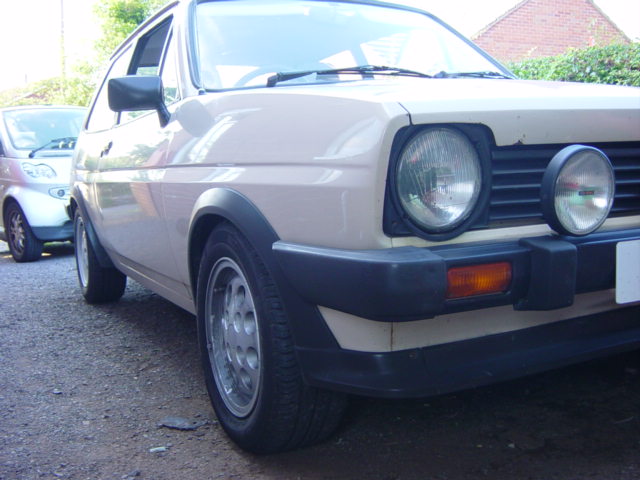
Welders
#1

Posted 04 December 2004 - 06:11 PM
I'm thinking of purchasing a cheap welder just to try and practice with and mess around with to get the hang of it (i do not plan on doing any serious precision bodywork or anything like that, just want to learn how to weld).
The problem comes that I'm in Cyprus and the choice of welders is very limited, in both brands and price.
I've found a bunch of different welders which seem pretty decent and come with a warranty from the shop so they should last me the time i want them for (around a year).
MIGs are VERY hard to come across at a decent price, so I'm left with arc welders. Is this a good idea to start with? If not I just won't get a welder and forget the whole idea.
Arc welders are rather cheap and easy to come by and I've done a bit of reading and I haven't really read any problem points with them, so what are your opinions?
Here's things I hope to do with the welder:
Welding things like brackets (e.g. exhaust, bonnet pin brackets)
Exhaust tubing?
Strengthening bars, rods (e.g. engine tie-rod)
Plug welding
Perhaps a few bits and pieces of scrap bodywork (not on my mini, just practice)
Random pieces of metal together like rods and angles etc. for the house/garden
You get the idea... just here and there, so I want something cheap that'll teach me how to weld without burning down the garage!
Here's two welders that I found from a tool shop that I like a lot and have good customer service, so should stand by the product if something does go wrong (don't see why it should since it won't see that much use anyway!)
Elto Scudo 160 Turbo. An italian arc welder with 1-160 amps, and 1-4mm electrode diameter.
GYS Inverter 2500. This one has only 80amps max with 1.6-2.5 electrode diameter. French
Both cost about the same (the GYS costing around 20 pounds more) and I'm leaning towards the elto. Don't know either of these brands, so to me one sounds as good as the other, so might as well go for the cheaper one that has a bigger range of current/electrode anyway!
I'm rather a newbie to this whole thing, and have only tried welding once with a MIG welder... is arc welding really all that different?
Thanks
#2

Posted 04 December 2004 - 06:49 PM
If you can't get MIG.. can you get gas instead? (oxygen/ascetaline).
Alex
#3

Posted 04 December 2004 - 07:39 PM
without the help of others when i first wanted to start welding i baught an arc welder, which i still have, because as you say they are cheap, i did manage to do the jobs i needed to do with it, with a lot of help from an angle grinder to get the large lumps smoothed out. i then baught myself a mig welder and it was money well worth spending, i only baught a cheap one and it does overheat and turn itself of now and again, but the results are far better and when you have had practice and get good you can do work for other people and make the money back, the gas is the key aswell with a mig welder, i started off using small gas bottles that came with it now i use industral bottles and use argoshield light as my gas.
so my advice would be to get a mig welder the extra spent is worth it i promise you, and as you say practice cut up small peices of metal and weld them together, change the settings and see what it does until you have the setting you can use and then adjust if need be for bigger jobs.
i still have tha arc welder i baught but now it just sits in the shed gathering dust until it is needed again
:wales: :wales:
#4

Posted 04 December 2004 - 07:43 PM
Incidentally, cowboy, did you get my PM a week or so back about the turbo shipment?
#5

Posted 04 December 2004 - 11:27 PM
can you get gas instead? (oxygen/ascetaline).
Can anyone clear this up once and for all? It has been posted on the forum a few times now that using oxy/acetelene is basically illegal for most car body repairs. Some of the mechanics on here say it's okay, but the body men seem to disagree. What do MOT inspectors and engineers think?
#6

Posted 04 December 2004 - 11:29 PM
also find yourself a friendly bar owner and 'borrow' one of his co2 bottles...
#7

Posted 04 December 2004 - 11:55 PM
Its no good for many body repairs because of the steel used in some areas of later cars is a mix (sadly can not remember which steels) and if you use gas it becomes brittle
Siggy
#8

Posted 05 December 2004 - 01:24 AM
Do you folks in Europe not have flux-core welders? These are basically MIG welders that use a filler wire with flux in the center (instead of using the cover gas). Most can be converted to true MIG welding by adding a gas flow meter and a control valve. 90 Amp flux core units can be had in the U.S. starting around $150 (cheap budget models) with "good" ones from companies like Lincoln costing around $400. Here MIGs start around $450 and go up quite a bit in price. If I were buying a unit on a budget with the need to grow... look for a flux-core welder that can be converted to true MIG.
There are attachments (made in the U.K.) you can buy for arc welders that will assist you in using them for panel work. One is a stitch welder attachment that helps you use small diameter rods to produce low power, short welds that you "stitch" together to complete a seam. The other is a spot welder attachement. Basically the spot welder attachment is a carbon arc electrode. You sandwich two clean, bare panels together and ground the bottom one. You use a pressure foot to hold the panels together and bring the carbon electrode into contact with the top panel... then pull a trigger to slowly pull it back. The resulting arc melts the top panel to the bottom one. I have one of these and have used it with mixed results. I prefer plug welding with a TIG.
You'll have to use a little math to take advantage of this "rule of thumb" but when I TIG weld I use about 1/2 AMP per 0.001" of metal thickness I'm joining. A 1mm thick panel is 0.040" thick, so I would set my welder to around 20 AMPs. This means a 90 AMP welder would be good for working on metal up to around 0.180" thick... not quite 5mm. If I were buying a MIG I'd look for something that has at least 150 AMPs and a very high duty cycle. The higher the duty cycle the longer you'll be able to weld at high power without stopping. Generally this means the internal transformers are better built and will run cooler, especially at the lower AMPs you use on panel work.
Sorry, I can't comment on the units you mentioned. In Europe isn't ESAB a big name in welders?
#9

Posted 05 December 2004 - 02:30 AM
legality wise it shouldnt matter what weld you use ase long as its safe and strong, i think it would be rather hard to tell what they used as long as they did a good weld wether it be brittle or not. any area around a weld would be more brittle than the original steel due to the high temperature.
#10

Posted 05 December 2004 - 08:57 AM
I'll start lookin for migs on monday, but the problem (aside from the cost) is also getting gas here all the time (not too cheap) and its size. I DO have a limited space, and that's why the arc welders are really good since they're pretty small.
Basically bottom line is that probably if I don't find a mig I'll probably get a cheap arc welder (something around 60-70 pounds) to mess around with, but won't bother spending more than that on one!
This thread proved to be quite educational really. Keep adding any info to it, and in a few days I'll lock it and move to FAQ.
#11

Posted 05 December 2004 - 02:37 PM
you can get good welds from this welder and it is suitable for up to 3mm,
these migs can be picked up for under £100 second hand,
I have had one at home for 12 years no problems and get good results using plain CO2 (i get refills at my local fire extinguisher shop)
#12

Posted 05 December 2004 - 03:46 PM
If you can get MIG go with it. One advantage it won't weld to rusty tin just burns it out.
#13

Posted 05 December 2004 - 04:13 PM
#14

Posted 05 December 2004 - 08:39 PM
Arc, to be blunt, is poo. Tricky to use and looks a mess. You get a sort of *woman of ill repute* forming which you have to chip off.
MIG is without a doubt the easiest, while the welders cost a little more than arc welders, the finish is better, it's easier to use, and it's quicker.
TIG and Oxy-Acetalene are very similar, TIG is just the modern version of O-A, and a LOT safer. Once I'd seen the BOC gas-welding safety video, I'd never want to play with Oxy-Acetalene again! Dangerous stuff. TIG is a lot safer, it's a bit more diffucult to use than MIG, but you get a better finish. Oh, and the machines cost a whole lot more.
If I was in your situation, I'd go for a MIG without a doubt, ge tthe most powerful one you can afford, and get a big bottle of argon, don't buy the disposable bottles, get a refillable, it's much cheaper.
Oh, and get a decent mask, one that you don't have to lift up all the time, much easier.
#15

Posted 05 December 2004 - 08:53 PM
Seen these on e-bay for about £25 or so are they any good?You do need to buy a descent solar powered mask with electric though. And that'll cost £100 from www.welduk.com
1 user(s) are reading this topic
0 members, 1 guests, 0 anonymous users























